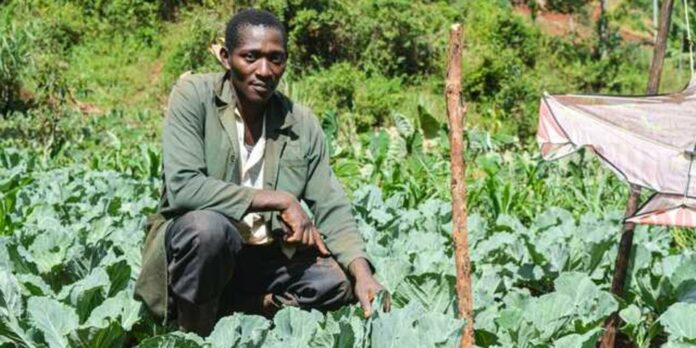Many young people in Kenya’s rural areas move to the major cities in search of job opportunities. While some are lucky enough to find good jobs, others join the list of jobless Kenyans.
David Maina Kamau is among the few Kenyans who discovered that he can make some good cash outside employment.
As such, he ventured into farming, a journey that has made him not only a successful farmer but also a role model to young people seeking employment.
On his farm in Kigomo village, Gatanga, Murang’a county, the 39-year-old grows different types of crops, including capsicum, cabbage, tomato, spinach, collard, Kales, and watermelon, among others.
Maina started farming in 2021 after technical officers from Upper Tana Nairobi Water Fund Trust trained him.
They taught him how to cheaply build a water pan, harvest water, conserve wetlands, practice agroforestry, test soil, and engage in other agronomic practices.
How I earn all year round from mixed farming
“I realized good life and cash can also come from the soil, instead of going to Nairobi and becoming a hawker. I wanted to be an example to young people. That is why I began mixed farming. Honestly, I have no regrets.” He said.
He started by constructing a borehole to ensure an enhanced supply of water to his farm. The farmer uses organic manure and buys pesticides occasionally to cut production costs.
Maina practices terrace ploughing on his sloped farm to control soil erosion. He also said that in slopy areas, one should choose plants with strong roots, like avocados.
“My farm has capsicum, cabbage, tomato, spinach, collard, sukuma wiki, and other vegetables. I also grow fruits like avocado, watermelon, tree tomato, and banana,” Maina said.
He sells cabbage at Sh40 while a crate of tomatoes goes for Sh7,000. Maina harvests three crates of tomatoes from the 600 plants every week. He also gets 100 to 200 kilos of capsicum a month.
Brothers striking riches in mixed farming
Through the income from mixed-crop farming, Maina has been able to educate his three children without relying on bursaries. He has also bought a piece of land in Meru County.
His greatest challenge in the venture is the high cost of fertilizer and other inputs, which he manages through the use of organic manure.










